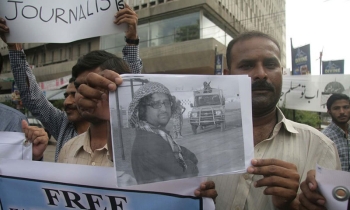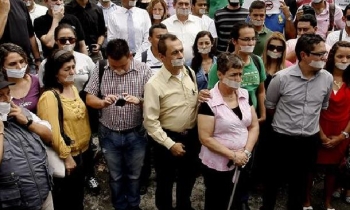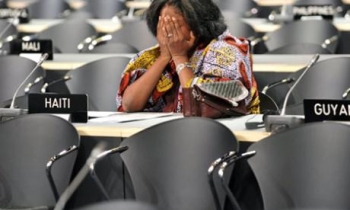More than 20 years after the fall of the Wall, Berlin is taking a small step toward establishing itself as the media hub of Germany, as the country’s biggest news agency and a newly reinvigorated rival consolidate their operations in the city this summer, says a New York Times report.
Yet in an echo of the Cold War divide, relations between the agencies — D.P.A, which was founded in postwar West Germany, and D.A.P.D., which traces some of its roots to the former Communist East — have turned decidedly frosty as they compete for business in a shrinking market for news.
The details: [Link]
D.P.A., or Deutsche Presse-Agentur, is owned by German newspapers, in similar fashion to The Associated Press in the United States, and it has long been the leading news wire in Germany. But since it was founded in 1949, it has never had the market to itself; among others, news services with ties to the postwar occupying powers — Reuters from Britain, Agence France-Presse from France and A.P. from the United States — opened German-language services.
Since the Wall came down, they have all competed with D.D.P., an agency built out of remnants of the old U.P.I. news wire and the former East German state-sponsored news service. Last year, D.D.P., now under private equity ownership, bolstered its position by acquiring the A.P. German-language wire. The combined agency, renamed D.A.P.D., for the first time is promoting itself as a full-service alternative to D.P.A., rather than just a supplement.
“Our strategy is to make D.P.A. dispensable,” one of the private equity owners, Peter Löw, said at a news conference when he and his business partner, Martin Vorderwülbecke, bought the A.P. service last year. Mr. Vorderwülbecke called D.P.A. a monopoly, and the two argued that certain D.P.A. business practices were anti-competitive.
Those comments did not sit well with D.P.A., which sued Mr. Löw and Mr. Vorderwülbecke for defamation. It also complained to the German competition authorities about the merger of the German A.P. and D.D.P. The cartel office is investigating.
“Up to now, we have always had fierce competition in Germany, but it was like a gentlemen’s competition,” said Malte von Trotha, chief executive of D.P.A. “Now we have a totally new dimension.”
D.A.D.P. has fired back with a lawsuit of its own, contending that D.P.A. contracts were anti-competitive because they locked customers into terms of five years or more and required notice periods of as much as one year to break. D.P.A. insists that the deals are legal.
The heightened competition between the wire services comes at a time when newspapers are wrestling with the effects of a deep downturn in advertising and a loss of readers to digital media outlets. As newspapers come under growing pressure to cut costs, the cost of maintaining news agency contracts is under intense scrutiny. In the United States, for example, several large publishers, including Chicago-based Tribune Co., have given notice of their intention to cancel their A.P. service. In France, where newspapers lurch from one crisis to the next, Agence France-Presse is under perennial financial pressure, and the government is now its biggest client; for now, proposals to restructure the agency are on hold, however.
In Germany, newspapers have generally fared better than their counterparts in the United States during the recession, suffering smaller losses in circulation and advertising. Still, one big regional publisher, the WAZ group, based in Essen, canceled its D.P.A. subscription last year, deciding to rely on a reduced agency roster. D.P.A. cited that move last month as a major reason why it had suffered a 4 percent decline in its revenue last year, to €90 million, or $113.7 million.
For now, most other publishers seem to be sticking with D.P.A. A Munich-based publisher, Dirk Ippen, recently tested production of a regional paper in Kassel without the use of D.P.A. for several weeks, but then decided to retain the service.
Meanwhile, Axel Springer, which publishes Bild, the German newspaper with the largest circulation, recently gave a big vote of confidence to D.P.A., canceling its D.D.P. service instead.
“The peer pressure for individual publishers not to move away from D.P.A. is strong,” said Marc Felix Serrao, a media editor at Süddeutsche Zeitung, which is based in Munich. “But if the crisis in advertising persists, you may see more attempts to save money, and you might see more people reconsidering.”
The competition between the agencies could heat up in September, when D.P.A. completes the consolidation of three main offices — in Hamburg, Frankfurt and Berlin — at new offices in the capital.
Also in September, D.A.P.D. will formally introduce its new service, which will integrate the existing German-language A.P. and D.D.P. feeds with access to the international, English-language A.P. wire.
D.P.A. is also upgrading its service, announcing a cooperation with A.F.P. in which correspondents from the two services have access to each other’s work. It says its foreign reporting is more appropriate for German newspapers than D.A.P.D.’s translated work from the English A.P. wire, because D.P.A. has its own foreign correspondents.
In response to complaints from some customers that it was aloof and unresponsive, D.P.A. also recently introduced a new online service that allows newspaper editors to provide live feedback on D.P.A. reporting assignments and articles in progress.
The system is open, so journalists at other newspapers can read the comments and weigh in, too.
D.A.P.D. is developing a similar system. It acknowledges that D.P.A. remains a more comprehensive service, with more full-time journalists — about 470 for D.P.A., compared with fewer than 300 for D.A.P.D. – but says it does not aim to match its bigger rival on every story.
“D.P.A. prefers today to talk a lot about quantity, and we like to talk about quality,” said Wolfgang Zehrt, a spokesman for D.A.P.D.
Both sides have toned down the bellicosity. But few analysts doubt that there will be further clashes. “You won’t find anyone at D.P.A. or D.A.P.D. calling it a war anymore, but it is,” Mr. Serrao said.









